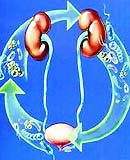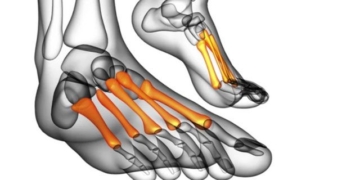Consider urinary bladder infection if a child experiences frequent urination, painful urination, or straining while urinating. Many children scream, feel scared, and panic during urination, often clutching or pulling on their genitals.
 |
| Circle of urinary tract infections (Image: SK & ĐS, VNE). |
Urinary tract infections are quite common in children, ranking third after respiratory and gastrointestinal infections. If not detected and treated promptly, the disease can lead to severe complications and consequences. The primary causative agents are gram-negative bacteria such as E. coli, Proteus, some intestinal cocci, viruses, and fungi.
Clinically, various forms of urinary tract infections can occur: pyelonephritis, renal pelvis infection, or upper urinary tract infections (often accompanied by interstitial nephritis); bladder infections or lower urinary tract infections.
The disease does not have specific symptoms, so clinical signs are only suggestive. For example, the child may have a high fever, chills, and general signs of infection or toxicity. Infants and young children may sometimes not exhibit fever but may show signs of sepsis such as jaundice or hypothermia. Affected children may urinate infrequently, experience painful urination, and have cloudy urine.
If a child has a bladder infection, they may exhibit frequent urination, painful urination, and straining. Many children scream in fear and panic when urinating. You might notice the child clutching their genitals. Occasionally, they may also complain of pain in the lower abdomen.
If the child has an upper urinary tract infection, in addition to systemic infection symptoms, they may complain of pain in the kidney area.
When a child shows suspicious symptoms, it is essential to take them to a medical center for tests, ultrasound, and X-rays for timely diagnosis.
Children with bladder infections are often treated at home with oral antibiotics such as amoxicillin, ampicillin, or cotrimoxazole. The treatment duration is typically 5-7 days. Children with upper urinary tract infections should be hospitalized.
Dr. Nguyễn Minh Hồng, Health & Life


















































